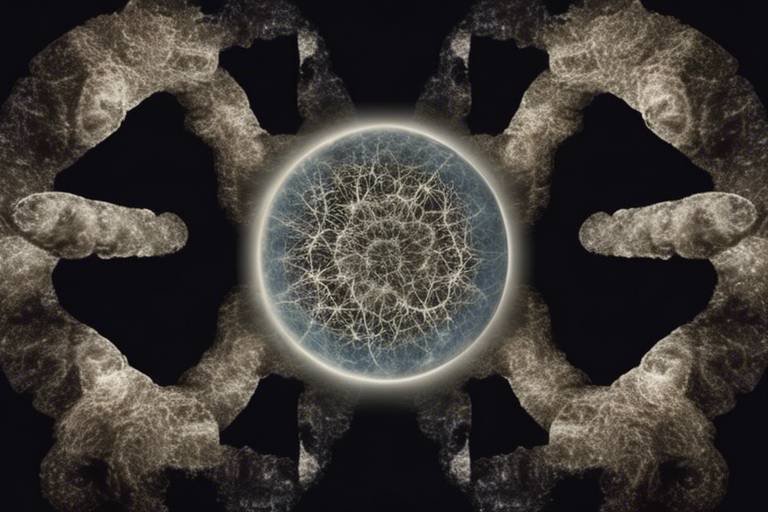Metaphysics - The Evolution of Ontological Arguments
Metaphysics, often considered the bedrock of philosophical inquiry, delves into the fundamental nature of reality, existence, and the universe. Among its many fascinating aspects is the study of ontological arguments, which seek to establish the existence of God through abstract reasoning alone. These arguments have undergone significant evolution over the centuries, shaped by various philosophers who have contributed their unique insights and critiques. As we journey through this philosophical landscape, we will explore the historical context of these arguments, the key thinkers who have influenced their development, and their relevance in contemporary discussions. This exploration is not merely academic; it invites us to ponder profound questions about existence and the nature of reality itself.
To truly grasp the significance of ontological arguments, we must first understand the philosophical milieu from which they emerged. The roots of these arguments can be traced back to ancient and medieval philosophy, where thinkers like Plato and Aristotle laid the groundwork for metaphysical inquiry. Their explorations into the nature of being and existence set the stage for later developments. For instance, Plato's theory of forms introduced the idea that non-material abstract forms, or ideas, represent the most accurate reality. This notion influenced later philosophers, who grappled with the relationship between existence and essence.
During the medieval period, the rise of scholasticism brought about a renewed interest in the synthesis of faith and reason. Thinkers like Augustine and Aquinas explored the nature of God and existence, further refining the ontological arguments that would follow. Aquinas, in particular, emphasized the necessity of God's existence as a foundational principle of reality, paving the way for more formalized arguments in the centuries to come.
Several philosophers have made indelible marks on the evolution of ontological arguments. Each brought their own unique lens to the discussion, enriching the philosophical tapestry. Anselm of Canterbury is perhaps the most notable figure in this regard. His ontological argument posits that God, being the greatest conceivable being, must exist in reality because existence is a perfection. This groundbreaking idea ignited a firestorm of debate and inquiry, challenging thinkers to defend or refute his claims.
Following Anselm, René Descartes introduced a modern perspective, arguing that clear and distinct perceptions of God necessitate His existence. Descartes emphasized reason as the pathway to understanding existence, intertwining rational thought with metaphysical inquiry. His contributions further propelled the discourse surrounding ontological arguments, inviting deeper exploration into the nature of existence.
Immanuel Kant later critiqued these arguments, asserting that existence is not a predicate and thus cannot be treated as a characteristic that enhances a being's greatness. His insights prompted a reevaluation of the relationship between existence and essence, significantly impacting philosophical thought.
Anselm's ontological argument is foundational in the realm of metaphysics. He famously stated that God is "that than which nothing greater can be conceived." This leads to a compelling conclusion: if such a being exists only in the mind, then a greater being could be conceived to exist in reality. Thus, for Anselm, God's existence is not merely a possibility but a necessity, as the greatest conceivable being must exist in both the mind and reality.
Despite its influence, Anselm's argument has faced rigorous critiques. Gaunilo, a contemporary of Anselm, argued through the analogy of a perfect island, suggesting that just because we can conceive of a perfect island does not mean it exists in reality. Kant also raised significant objections, asserting that existence is not a property that can be attributed to a being. These critiques have sparked extensive philosophical debates, leading to a deeper understanding of the nuances of existence and essence.
Anselm's work laid a robust foundation for future metaphysical discussions. His ideas influenced not only Descartes but also Leibniz, who expanded on the concept of existence within his own philosophical framework. The ongoing dialogue surrounding these arguments has shaped the trajectory of metaphysical inquiry, prompting subsequent thinkers to explore the intricacies of existence and the divine.
René Descartes advanced the discussion of ontological arguments by emphasizing the importance of clear and distinct perceptions. For Descartes, understanding God through reason was paramount; he believed that our innate ideas of perfection and existence point to a higher reality. His rationalist approach highlighted the interplay between reason and existence, establishing a modern perspective that continues to resonate in philosophical discourse today.
Even in the 21st century, ontological arguments remain a vibrant topic of discussion among contemporary philosophers. As we grapple with questions about existence, reality, and the nature of God, the relevance of these arguments becomes even more pronounced. The philosophical landscape has evolved, yet the core inquiries into existence persist, reflecting our enduring curiosity about the universe and our place within it.
In recent years, analytic philosophers have revisited ontological arguments, employing formal logic and language analysis to evaluate their validity. This approach has led to new insights and interpretations, enriching our understanding of metaphysical claims. By scrutinizing the structure of these arguments, contemporary thinkers have illuminated aspects that previous generations may have overlooked, demonstrating that the dialogue surrounding existence is far from over.
The 21st century presents unique challenges to ontological arguments. Scientific advancements and shifts in philosophical paradigms prompt a reevaluation of traditional metaphysical claims. As our understanding of the universe expands, so too does our need to reconcile these insights with age-old philosophical inquiries. The interplay between science and metaphysics invites us to reconsider what we know about existence and the nature of reality.
- What is an ontological argument? An ontological argument is a philosophical argument that attempts to prove the existence of God through abstract reasoning alone, rather than through empirical evidence.
- Who is the most famous proponent of the ontological argument? Anselm of Canterbury is widely regarded as the most famous proponent, having formulated the original argument in the 11th century.
- What are common critiques of ontological arguments? Critics like Gaunilo and Kant argue that existence cannot be treated as a predicate and that conceptualizing a perfect being does not necessitate its existence in reality.
- How do contemporary philosophers view ontological arguments? Contemporary philosophers engage with ontological arguments through various lenses, including analytic philosophy, often employing formal logic to reassess their validity in light of modern understanding.

Historical Context of Ontological Arguments
The journey into the realm of ontological arguments is like stepping into a vast, intricate tapestry woven from the threads of ancient and medieval philosophy. To truly grasp the significance of these arguments, we must first delve into the historical context that shaped their inception. The philosophical landscape of the time was rich with ideas and debates that questioned the very nature of existence. Thinkers such as Plato and Aristotle laid the groundwork, pondering the essence of being and the nature of reality. Their explorations of metaphysics set the stage for later scholars to grapple with profound questions about existence, particularly in relation to the divine.
In the medieval period, the influence of religious thought became increasingly prominent. Philosophers like Augustine and Aquinas sought to reconcile faith with reason, drawing upon the works of earlier thinkers while also introducing new concepts. This era was characterized by a deep engagement with the nature of God and existence, leading to the formulation of arguments that would later be categorized as ontological. The dialectic between faith and reason became a central theme, with scholars striving to demonstrate the existence of God through logical reasoning rather than mere belief.
As we move into the 11th century, we encounter Anselm of Canterbury, whose groundbreaking ontological argument emerged as a pivotal moment in this ongoing philosophical dialogue. Anselm's assertion that God, as the greatest conceivable being, must exist in reality, sparked a firestorm of debate that resonated through the centuries. His ideas were not birthed in isolation; rather, they were influenced by the rich intellectual traditions that preceded him. In this way, the historical context of ontological arguments is not just a backdrop but a vital component of their evolution.
The medieval philosophical tradition was not without its critics. The early challenges to Anselm's argument, particularly from Gaunilo, highlighted the need for rigorous scrutiny of these ideas. Gaunilo famously argued that one could conceive of a perfect island, yet that does not necessitate its existence. This critique prompted philosophers to refine their arguments, leading to a deeper exploration of the relationship between existence and essence. The ongoing dialogue and contention surrounding these ideas contributed to the richness of metaphysical inquiry.
In essence, the historical context of ontological arguments is a narrative filled with tension, innovation, and transformation. It reflects a time when the quest for understanding the divine and the nature of existence was intertwined with the evolution of philosophical thought. As we continue to explore the contributions of key philosophers, it becomes evident that these ontological arguments were not merely abstract concepts; they were deeply embedded in the cultural and intellectual milieu of their time, influencing the trajectory of metaphysics for generations to come.

Key Philosophers and Their Contributions
The realm of metaphysics has been profoundly shaped by the insights of various philosophers, each contributing unique perspectives on ontological arguments. Among these thinkers, Anselm, Descartes, and Kant stand out as pivotal figures whose ideas have not only influenced their contemporaries but continue to resonate in today's philosophical discourse. Their arguments, critiques, and expansions on the concept of existence have created a rich tapestry of thought that invites both admiration and scrutiny.
Anselm of Canterbury is often hailed as the architect of the ontological argument. His assertion that God is "that than which nothing greater can be conceived" serves as a cornerstone for later philosophical inquiry. Anselm's logic follows that if such a being exists in the mind, it must also exist in reality; otherwise, it would not be the greatest conceivable being. This profound assertion ignited a firestorm of debate, prompting others to either support or contest his views. Anselm's work exemplifies how a single idea can catalyze an entire field of philosophical exploration.
Following Anselm, René Descartes brought a modern twist to the ontological argument. His famous declaration, "Cogito, ergo sum" (I think, therefore I am), reflects his belief in the primacy of reason. Descartes argued that the very act of thinking about a perfect being implies its existence, as existence is a necessary attribute of perfection. His rationalist approach emphasized the interplay between reason and existence, marking a significant shift from earlier metaphysical discussions. Descartes' contributions not only built upon Anselm's foundation but also introduced a new methodology that influenced subsequent philosophical thought.
However, not all philosophers agreed with Anselm and Descartes. Immanuel Kant emerged as a formidable critic, challenging the very premises of their arguments. He posited that existence is not a predicate or attribute that can enhance the concept of a being; rather, it is a condition of the being itself. Kant's critique forced philosophers to reevaluate the relationship between existence and essence, urging a more nuanced understanding of what it means for something to exist. His ideas prompted deeper exploration into the nature of reality, encouraging future thinkers to grapple with the complexities of existence in ways that were previously unconsidered.
In addition to these three giants, the evolution of ontological arguments has been further enriched by the contributions of other notable philosophers, such as Gottfried Wilhelm Leibniz, who introduced the principle of sufficient reason, suggesting that everything must have a reason or explanation for its existence. This principle adds another layer to the discussion, pushing the boundaries of metaphysical inquiry. The interplay of these various perspectives creates a dynamic landscape of thought, where each philosopher builds upon the ideas of those before them, leading to a continuous evolution of ontological arguments.
As we delve further into the contributions of these philosophers, it becomes clear that their debates and discussions have not only shaped metaphysical thought but have also laid the groundwork for contemporary discussions surrounding existence and reality. Their legacies remind us that the quest for understanding existence is a journey filled with questions, challenges, and revelations that span centuries.
In summary, the contributions of Anselm, Descartes, Kant, and others have significantly shaped the discourse on ontological arguments. Their unique perspectives invite us to reflect on fundamental questions about existence, urging us to explore the depths of metaphysical thought. As we continue to engage with these ideas, we find that the conversation is far from over, and the relevance of these arguments remains as potent today as it was in the past.
- What is an ontological argument? An ontological argument is a philosophical argument for the existence of God based on the concept of being or existence itself.
- Who first proposed the ontological argument? The ontological argument was first proposed by Anselm of Canterbury in the 11th century.
- How did Descartes contribute to ontological arguments? Descartes expanded on Anselm's ideas by arguing that the very concept of a perfect being implies its existence.
- What was Kant's critique of ontological arguments? Kant argued that existence is not a predicate and cannot be used to define the essence of a being.

Anselm's Argument for God's Existence
At the heart of metaphysical discussions lies , a profound assertion that has sparked debate for centuries. Anselm, a medieval philosopher, proposed that God is "that than which nothing greater can be conceived." This definition is not merely a playful linguistic exercise; it serves as the cornerstone of his ontological argument. Anselm argues that if we can conceive of such a being in our minds, then it must exist in reality. Why? Because existence in reality is greater than existence merely in the understanding. Imagine a perfect island; if it exists only in your mind, it cannot be the greatest island. Thus, Anselm concludes, God must exist in reality to truly be the greatest conceivable being.
This argument is both simple and profound, challenging us to rethink our assumptions about existence and non-existence. Anselm's reasoning can be broken down into several key points:
- Definition of God: God is the greatest conceivable being.
- Existence in Understanding: If God exists in the mind, He must also exist in reality.
- Conclusion: Therefore, God exists.
However, Anselm's argument is not without its critics. Philosophers like Gaunilo countered with the idea of a perfect island, suggesting that just because we can conceive of something perfect does not mean it exists. Kant later added another layer of critique, arguing that existence is not a predicate or quality that adds to the essence of a being. These critiques have led to a rich tapestry of discussion and inquiry, pushing philosophers to delve deeper into the nature of existence itself.
Despite the criticisms, Anselm's argument has had a lasting impact on philosophical thought. It has inspired countless thinkers, including Descartes and Leibniz, to explore the relationship between existence and essence further. Anselm's work serves as a launching pad for modern discussions about the nature of reality and the divine, making it a pivotal moment in the evolution of metaphysical thought.
In essence, Anselm's argument invites us to engage with some of the most profound questions of existence: What does it mean to exist? Can we truly understand the nature of the divine? As we navigate through these inquiries, Anselm's insights continue to resonate, reminding us of the intricate dance between thought and reality.

Critiques of Anselm's Argument
Anselm's ontological argument is undoubtedly a cornerstone of metaphysical thought, yet it has not escaped scrutiny. Critics have raised significant challenges that question the validity of his claims. One of the most notable critiques comes from the monk Gaunilo, who argued that Anselm's reasoning could be applied to anything, not just God. Gaunilo proposed the idea of a perfect island—if we can conceive of the greatest possible island, does it not also have to exist? This analogy suggests that just because we can imagine something as the greatest does not mean it necessarily exists in reality. This line of attack highlights a critical flaw in Anselm's logic: the leap from conceptual existence to actual existence is not as straightforward as Anselm posited.
Furthermore, Immanuel Kant offered a profound critique, emphasizing the distinction between existence and essence. Kant argued that existence is not a predicate or a property that can be attributed to a being. In his view, saying that God exists does not add anything to the concept of God as the greatest conceivable being. To Kant, existence is not something that can be included in the definition of God; rather, it must be demonstrated through experience or empirical evidence. This perspective fundamentally challenges the basis of Anselm's argument, suggesting that it rests on a flawed premise.
While these critiques are essential, they have led to deeper philosophical inquiries about the nature of existence itself. For instance, the implications of Gaunilo's perfect island analogy have prompted discussions about the nature of perfection and whether it can exist outside of human conception. Similarly, Kant's views have influenced a range of philosophical movements, including existentialism and phenomenology, which explore the relationship between existence and human experience.
In the contemporary philosophical landscape, these critiques continue to resonate, prompting ongoing debates about the validity of ontological arguments. The challenge lies not only in defending Anselm's original claims but also in understanding how these arguments fit within the broader context of metaphysical inquiry. As we delve deeper into these discussions, it becomes evident that Anselm's argument, despite its flaws, serves as a catalyst for philosophical exploration—a springboard for questioning the very nature of existence and the divine.
In summary, Anselm's ontological argument has sparked a wealth of critiques that have enriched metaphysical discourse. The challenges posed by Gaunilo and Kant, among others, have not only questioned the validity of Anselm's original assertions but have also opened up new avenues for exploration in the realm of existence and essence. As we continue to grapple with these philosophical questions, the relevance of Anselm's argument remains, inviting both critique and contemplation.
- What is Anselm's ontological argument? Anselm's argument posits that God, as the greatest conceivable being, must exist in reality because existence is a necessary attribute of perfection.
- Who are the main critics of Anselm's argument? Notable critics include Gaunilo, who introduced the perfect island analogy, and Immanuel Kant, who argued that existence is not a predicate.
- Why is the critique of Anselm's argument important? These critiques challenge the foundations of ontological arguments, prompting deeper philosophical discussions about existence and essence.
- How do contemporary philosophers view Anselm's argument? Contemporary philosophers continue to engage with Anselm's argument, often revisiting it in light of modern philosophical and scientific developments.

Impact on Later Philosophical Thought
The impact of Anselm's ontological argument on later philosophical thought is nothing short of revolutionary. His assertion that God is "that than which nothing greater can be conceived" not only sparked intense debate during his time but also laid the groundwork for future philosophical inquiries into the nature of existence and the divine. Anselm's ideas resonated through the corridors of time, influencing a myriad of thinkers who sought to grapple with the profound questions he raised.
One of the most notable philosophers influenced by Anselm was René Descartes. Descartes, often hailed as the father of modern philosophy, took Anselm's foundational ideas and expanded upon them. He introduced the concept of clear and distinct perceptions, arguing that the very act of thinking about a perfect being implies its existence. This line of reasoning not only reinforced Anselm's argument but also shifted the focus toward a more rationalist approach in metaphysics. Descartes' adaptation of Anselm's ideas can be summarized in the following points:
- Emphasis on reason as a pathway to understanding existence.
- Introduction of the idea that existence is a necessary attribute of a perfect being.
- Creation of a systematic approach to philosophical inquiry that influenced subsequent thinkers.
Another significant figure in this lineage is Gottfried Wilhelm Leibniz, who further developed the ontological argument by incorporating his own metaphysical framework. Leibniz posited that existence is a predicate, meaning that a being's existence is an essential quality that can be deduced through reason. His contributions not only reinforced the discussions initiated by Anselm but also opened the door to new interpretations and critiques, leading to a richer tapestry of metaphysical thought.
Moreover, the dialogue surrounding Anselm's argument continued into the Enlightenment and beyond, shaping the ideas of philosophers such as Immanuel Kant. Kant famously critiqued the ontological argument by asserting that existence is not a predicate and that one cannot define something into existence. His challenge prompted a reevaluation of the relationship between existence and essence, further complicating the discourse initiated by Anselm.
In summary, the impact of Anselm's ontological argument on later philosophical thought is profound and multifaceted. It has influenced a diverse array of thinkers and has led to an ongoing conversation about the nature of existence, the divine, and the very foundations of metaphysical inquiry. This legacy continues to shape contemporary discussions, making Anselm's work not just a historical footnote but a living part of philosophical exploration.
- What is the ontological argument? The ontological argument is a philosophical argument for the existence of God, proposing that the very concept of a perfect being implies its existence.
- Who first proposed the ontological argument? The ontological argument was first proposed by Anselm of Canterbury in the 11th century.
- How did Descartes influence the ontological argument? Descartes built upon Anselm's ideas, emphasizing the role of reason and clear perceptions in establishing the existence of God.
- What were Kant's criticisms of the ontological argument? Kant criticized the argument by asserting that existence is not a predicate and cannot be defined into existence.

Descartes and the Modern Perspective
René Descartes, often hailed as the father of modern philosophy, took the ontological argument and infused it with a fresh perspective that resonated with the intellectual currents of his time. His approach was characterized by a rigorous emphasis on reason and clarity, which he believed were essential for understanding the nature of existence. Descartes posited that our perceptions, particularly those that are clear and distinct, hold the key to unraveling the mysteries of reality. This notion of clear and distinct perceptions became a cornerstone of his philosophical methodology, serving as a lens through which he examined the existence of God.
In his seminal work, Meditations on First Philosophy, Descartes presented an argument that built upon Anselm's foundations but added a modern twist. He argued that the very concept of a supremely perfect being—God—entails existence. If we can conceive of such a being, then it must exist in reality; otherwise, it would not be supremely perfect. This line of reasoning not only sought to validate God's existence but also aimed to establish a framework for understanding reality through the lens of rational thought.
To illustrate Descartes' perspective, consider the following points:
- Existence as a Predicate: Descartes claimed that existence is a necessary attribute of a perfect being. Just as a triangle must have three sides, a perfect God must exist.
- Interplay of Reason and Faith: For Descartes, reason and faith were not mutually exclusive; instead, they complemented each other in the quest for truth.
- Foundation for Knowledge: His arguments laid the groundwork for epistemology, questioning how we know what we know and the role of doubt in the pursuit of certainty.
Despite his compelling arguments, Descartes did not escape critique. Philosophers like Kant later challenged the validity of his assertions, arguing that existence is not a predicate that can simply be added to the essence of a being. This sparked a renewed debate about the nature of existence and the limitations of human understanding, emphasizing the complexity of ontological discussions.
In summary, Descartes' modern perspective on ontological arguments marked a significant evolution in metaphysical thought. By intertwining reason with the quest for understanding existence, he opened new avenues for philosophical inquiry that continue to resonate in contemporary discussions. His work not only influenced later philosophers but also established a framework that remains relevant in the ongoing exploration of existence and reality.

Contemporary Relevance of Ontological Arguments
In the bustling arena of modern philosophy, ontological arguments are not merely relics of the past; they are vibrant and engaging topics that continue to spark heated debates among scholars and thinkers alike. The relevance of these arguments today can be attributed to several factors that intertwine philosophical inquiry with contemporary issues. As we navigate through a world increasingly shaped by science and technology, the fundamental questions of existence and reality remain at the forefront of human contemplation.
One of the most compelling reasons that ontological arguments maintain their significance is their ability to challenge our understanding of existence itself. Think about it: when we ponder the nature of reality, we are not just asking whether something exists; we are also questioning what it means for something to exist. This duality of inquiry is where ontological arguments shine. They compel us to examine the essence of being and the implications that arise when we assert the existence of a supreme being, or God.
Moreover, contemporary philosophers have revisited these arguments through the lens of analytic philosophy, employing formal logic and rigorous language analysis. This approach has led to fresh interpretations and insights that breathe new life into age-old discussions. For instance, philosophers like Alvin Plantinga have revitalized ontological arguments by introducing modal logic, which examines possibility and necessity in a way that resonates with modern understandings of existence. The dialogue surrounding these arguments has evolved, allowing for a more nuanced appreciation of their implications in light of contemporary thought.
Additionally, the rise of scientific advancements poses intriguing challenges to ontological arguments. In an age where empirical evidence reigns supreme, the question arises: can metaphysical claims hold their ground against the rigorous scrutiny of scientific inquiry? This tension between faith and reason, between the seen and the unseen, invites a reevaluation of traditional metaphysical claims. As we delve into the intricacies of quantum physics or the vastness of the universe, we are often left grappling with profound questions that ontological arguments seek to address.
Furthermore, the ongoing debates surrounding the existence of God and the nature of reality are not merely academic; they resonate with the personal experiences and existential crises faced by individuals today. Many find themselves questioning their beliefs in a world filled with uncertainty and rapid change. In this context, ontological arguments serve as a philosophical anchor, offering a framework for grappling with the complexities of existence. They challenge us to consider not just whether God exists, but what that existence entails for our understanding of ourselves and the universe.
In summary, the contemporary relevance of ontological arguments lies in their ability to engage with pressing philosophical questions, their adaptability to modern analytical methods, and their resonance with personal and societal dilemmas. As we continue to explore the depths of metaphysical inquiry, these arguments will undoubtedly remain a vital part of the conversation, inviting us to ponder the nature of existence in an ever-evolving world.
- What is an ontological argument? An ontological argument is a philosophical reasoning that attempts to prove the existence of God through abstract reasoning alone, rather than empirical evidence.
- Who first proposed the ontological argument? The ontological argument was first proposed by St. Anselm of Canterbury in the 11th century.
- Why are ontological arguments still relevant today? They remain relevant as they challenge our understanding of existence and engage with contemporary philosophical and scientific discussions.
- How do modern philosophers approach ontological arguments? Many modern philosophers use formal logic and analytic philosophy to revisit and reinterpret ontological arguments.

Analytic Philosophy and Ontological Arguments
Analytic philosophy has breathed new life into the age-old discussions surrounding ontological arguments. In this modern context, philosophers have turned to the tools of formal logic and linguistic analysis to dissect and evaluate these arguments with a fresh perspective. Imagine peeling back the layers of an onion; each layer reveals deeper insights into the structure and validity of the arguments that have persisted through centuries. This analytical approach seeks to clarify the often murky waters of metaphysical claims, allowing for a more rigorous examination of concepts such as existence and essence.
One of the key features of analytic philosophy is its emphasis on clarity and precision. Philosophers like W.V.O. Quine and Saul Kripke have contributed significantly to this field, applying logical frameworks to ontological discussions. For instance, Kripke's modal logic introduced a new dimension to the debate by allowing for the consideration of possible worlds, thus expanding the scope of ontological arguments. In this framework, the existence of entities is not merely about their actualization in our world but also about their potential existence across various possible scenarios.
This shift has led to a resurgence of interest in classic ontological arguments, as contemporary philosophers engage with them using modern tools. The dialogue often revolves around the following key questions:
- What does it mean for something to exist?
- How do we define existence in a logical framework?
- Can we separate the essence of a being from its existence?
Through rigorous analysis, analytic philosophers have sought to address these questions, leading to a variety of interpretations and conclusions about ontological arguments. For example, some argue that existence is not a property in the same way that other attributes (like color or size) are, while others contend that the very act of defining a concept implies its existence in some form. This ongoing debate reflects the dynamic nature of philosophy itself; just as science evolves with new discoveries, so too does philosophical inquiry adapt to new perspectives and methodologies.
Moreover, the application of formal logic has allowed philosophers to construct more robust arguments and counterarguments, often resulting in a rich tapestry of discourse. The interplay between traditional ontological arguments and contemporary analytic philosophy illustrates a fascinating evolution of thought. In essence, analytic philosophy does not merely critique the past; it reinterprets it, offering new avenues for understanding the fundamental questions of existence that have puzzled humanity for millennia.
As we navigate through these discussions, it becomes clear that the relevance of ontological arguments endures, continuously inviting philosophers to engage with the nature of reality and existence. This is a testament to the strength of these arguments and their ability to adapt to the changing landscape of philosophical thought. The dialogue remains vibrant, challenging us to reconsider what we know about existence and the universe.
- What is an ontological argument? An ontological argument is a philosophical argument for the existence of God that uses the concept of being or existence as its basis.
- Who are some key figures in the development of ontological arguments? Key figures include Anselm of Canterbury, René Descartes, and Immanuel Kant, among others.
- How does analytic philosophy approach ontological arguments? Analytic philosophy employs formal logic and language analysis to critically evaluate and reinterpret ontological arguments.
- Why are ontological arguments still relevant today? They continue to engage contemporary thinkers in discussions about existence, reality, and the nature of God, reflecting ongoing debates in metaphysical inquiry.

Challenges in the 21st Century
As we dive into the 21st century, ontological arguments face a myriad of challenges that are not only philosophical but also scientific. The rapid advancement of technology and science has reshaped our understanding of existence and reality. For instance, the rise of quantum physics and the exploration of the universe have led many to question traditional metaphysical claims, including those about the existence of God. How can we reconcile the abstract nature of ontological arguments with the concrete findings of modern science? It's a puzzle that many thinkers are grappling with today.
Moreover, the increasing influence of empiricism and naturalism has shifted the philosophical landscape. Many contemporary philosophers argue that knowledge should be derived from observable phenomena rather than abstract reasoning. This has led to a resurgence of skepticism towards arguments that rely heavily on logical deduction without empirical support. In this context, ontological arguments can seem out of touch, as they often hinge on definitions and concepts that may not hold up under the scrutiny of scientific inquiry.
Another challenge is the rise of analytic philosophy, which emphasizes clarity and precision in language. Analytic philosophers have revisited ontological arguments, employing formal logic to dissect and evaluate their validity. This rigorous approach has resulted in new interpretations and criticisms, pushing philosophers to refine their arguments or risk being dismissed as outdated. The modern philosopher must ask: how can one defend the existence of God using a framework that is increasingly seen as nebulous and abstract?
To illustrate some of these challenges, consider the following table that summarizes key issues faced by ontological arguments in contemporary discussions:
| Challenge | Description |
|---|---|
| Scientific Advancements | New discoveries in physics and biology challenge traditional metaphysical claims. |
| Empiricism | Focus on observable phenomena undermines abstract reasoning used in ontological arguments. |
| Analytic Philosophy | Emphasis on clarity and logic leads to rigorous scrutiny of ontological claims. |
Finally, the ongoing dialogue between theism and atheism has intensified in the digital age, with social media platforms allowing for a plethora of voices to weigh in on these age-old debates. The accessibility of information has democratized philosophical discussions, giving rise to new interpretations and critiques of ontological arguments. As a result, contemporary philosophers must navigate a complex landscape filled with diverse viewpoints and an ever-evolving understanding of existence.
In conclusion, the challenges faced by ontological arguments in the 21st century are multifaceted, requiring a reevaluation of traditional claims in light of modern scientific and philosophical developments. The dialogue continues, and it remains to be seen how these arguments will adapt and evolve in response to the changing tides of thought.
Frequently Asked Questions
- What is an ontological argument?
An ontological argument is a philosophical argument that attempts to prove the existence of God through abstract reasoning alone, rather than through empirical evidence. It suggests that the very concept of a perfect being implies its existence, as existence is a necessary attribute of perfection.
- Who first proposed the ontological argument?
The ontological argument was first proposed by the medieval philosopher Anselm of Canterbury in the 11th century. Anselm argued that God, defined as the greatest conceivable being, must exist in reality because existing in reality is greater than existing only in the mind.
- What are some critiques of Anselm's argument?
Critics like Gaunilo and Immanuel Kant have challenged Anselm's argument. Gaunilo argued that one could define anything into existence, while Kant claimed that existence is not a predicate or property that can be attributed to a being. These critiques have sparked significant debate in philosophical circles.
- How did Descartes contribute to ontological arguments?
René Descartes built upon Anselm's ideas by introducing the concept of clear and distinct perceptions. He argued that the existence of a perfect being (God) is as self-evident as mathematical truths, suggesting that the clarity of our ideas about God implies His existence.
- Are ontological arguments still relevant today?
Yes, ontological arguments remain a significant topic in contemporary philosophy. Modern philosophers continue to engage with these arguments, exploring their implications in light of new scientific discoveries and philosophical developments, making them a lively area of debate.
- What role does analytic philosophy play in ontological arguments?
Analytic philosophy has revitalized interest in ontological arguments by applying formal logic and language analysis. This approach has led to new interpretations and a deeper understanding of the arguments, allowing for rigorous evaluation of their validity and implications.
- What challenges do ontological arguments face in the 21st century?
Ontological arguments face challenges from scientific advancements and shifts in philosophical paradigms. The rise of empirical science and naturalism prompts a reevaluation of traditional metaphysical claims, questioning whether abstract reasoning alone can sufficiently establish the existence of God.



















